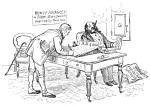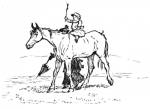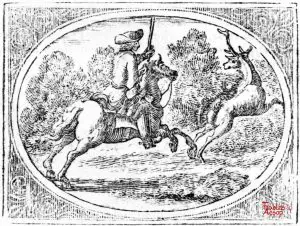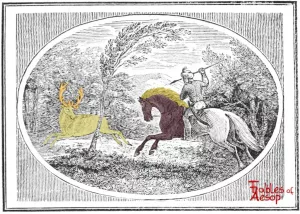If you allow men to use you for your own purposes, they will use you for theirs. A horse lets a rider mount to chase a stag. The rider keeps the horse.
If you allow men to use you for your own purposes, they will use you for theirs.

Eliot/Jacobs Version
A quarrel had arisen between the Horse and the Stag, so the Horse came to a Hunter to ask his help to take revenge on the Stag. The Hunter agreed, but said: “If you desire to conquer the Stag, you must permit me to place this piece of iron between your jaws, so that I may guide you with these reins, and allow this saddle to be placed upon your back so that I may keep steady upon you as we follow after the enemy.”
The Horse agreed to the conditions, and the Hunter soon saddled and bridled him. Then with the aid of the Hunter the Horse soon overcame the Stag, and said to the Hunter: “Now, get off, and remove those things from my mouth and back.”
“Not so fast, friend,” said the Hunter. “I have now got you under bit and spur, and prefer to keep you as you are at present.”

Caldecott
There was a Horse who had a meadow all to himself until a Stag came and began to injure the pasture. The Horse, eager to punish the Stag, asked a man whether there was any way of combining to do this. “Certainly,” said the Man, “if you don’t object to a bridle and to my mounting you with javelins in my hand.” The Horse agreed, and was mounted by the Man; but, instead of being revenged on the Stag, he himself became a servant to the Man.

Townsend version
At one time the Horse had the plain entirely to himself. Then a Stag intruded into his domain and shared his pasture. The Horse, desiring to revenge himself on the stranger, asked a man if he were willing to help him in punishing the Stag. The man replied that if the Horse would receive a bit in his mouth and agree to carry him, he would contrive effective weapons against the Stag. The Horse consented and allowed the man to mount him. From that hour he found that instead of obtaining revenge on the Stag, he had enslaved himself to the service of man.

Samuel Croxall
THE Stag, with his sharp horns, got the better of the Horse, and drove him clear out of the pasture where they used to feed together. So the latter craved the assistance of man; and, in order to receive the benefit of it, suffered him to put a bridle into his mouth and a saddle upon his back. By this way of proceeding, he entirely defeated his enemy; but was mightily disappointed, when, upon. returning thanks and desiring to be dismissed, he received this answer: No; I never knew before how useful a drudge you were; now I have found what you are good for, you may depend upon it I will keep; you to it.
THE APPLICATION
As the foregoing fable was intended to caution us against consenting to any thing that might prejudice public liberty; this may serve to keep us upon our guard in the preservation of that which is of a private nature. This is the use and interpretation given of it by Horace, the best and most polite philosopher that ever wrote. After reciting the fable, he applies it thus: This, says he, is the case with him, who, dreading poverty, parts with that invaluable jewel, liberty; like a wretch as he is, he will always be subject to a tyrant of some sort or other, and be a slave for ever; because his avaricious spirit knew not how to be contented with that moderate competency, which he might have possessed, independent of all the world.

Thomas Bewick (The Horse and The Stag)
In ancient times, when the Horse and the Deer ranged the forest with uncontrolled freedom, it happened that contentions arose between them about grazing in particular meadows. These disputes ended in a conflict between them, in which the Deer proved victorious, and with his sharp horns drove the Horse from the pasture. Full of disappointment and chagrin, the Horse applied to the Man, and craved his assistance, in order to re-establish him in the possession of his rights. The request was granted, on condition that he would suffer himself to be bridled, saddled, and mounted by his new ally, with whose assistance he entirely defeated his enemy; but the poor Horse was mightily disappointed when, upon returning thanks to the Man, and desiring to be dismissed, he received this answer: No, I never knew before how useful a drudge you were; now I have found what you are good for, you may be assured I will keep you to it.
APPLICATION.
Victories may be purchased at too dear a rate, if we solicit the assistance of allies capable of becoming our most formidable enemies, and it will be vain to flatter ourselves, that the yoke of slavery, if we once willingly suffer it to be laid upon our shoulders, can be easily shaken off, when the ends for which we bore it are accomplished. The Fable is intended to caution us against consenting to any thing that might prejudice public liberty, as well as to keep us upon our guard in the preservation of that which is of a private nature. This is the use and interpretation given of it by Horace, one of the best and most polite philosophers that ever wrote. After reciting the Fable, he applies it thus: This, says he, is the case of him, who, dreading poverty, parts with that invaluable jewel, liberty; like a wretch as he is, he will always be subject to a tyrant of some sort or another, and be a slave for ever, because his avaricious spirit knew not how to be contented with that moderate competency, which he might have possessed independent of all the world.
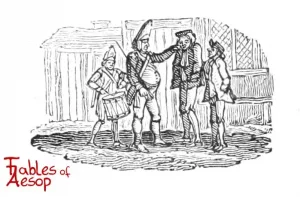

JBR Collection
The Horse having quarrelled with the Stag, and being unable to revenge himself upon his enemy, came to a Man and begged his help. He allowed the Man to saddle and bridle him, and together they ran clown the Stag and killed him. The Horse neighed with joy, and, thanking his rider warmly, asked him now to remove his saddle and let him go. “No, no,” said the Man; “you are much too useful to me as you are.” The Horse thenceforward served the Man, and found that he had gratified his revenge at the cost of his liberty.

L’Estrange version
Upon a dispute betwixt a stag and a horse about a piece of pasture, the stag got the better on’t, and beat the other out of the field. The horse, upon this affront, advis’d with a man what course to take; who told him, that if he would submit to be bridled, and sadled, and take a man upon his back with a lance in his hand, he would undertake to give him the satisfaction of a revenge. The horse came to his terms, and for the gratifying of a present passion, made himself a slave all the days of his life. Stesichorus made use of this fable, to divert the Himerenses from chusing Phalaris the tyrant for their general. This horse’s case, says he, will be yours, if you go on with your proposals. ‘Tis true, you’l have your revenge, but you’l lose your liberties; upon which words the motion fell.
Moral
Let every man take a true measure of himself, what he is able to do, and what not; before he comes to any peremptory resolution how to proceed. He is a madman, that to avoid a present, and a less end, runs blindfolded into a greater; and for the gratifying of a froward humour, makes himself a slave all the days of his life.

Crane Poetry Visual
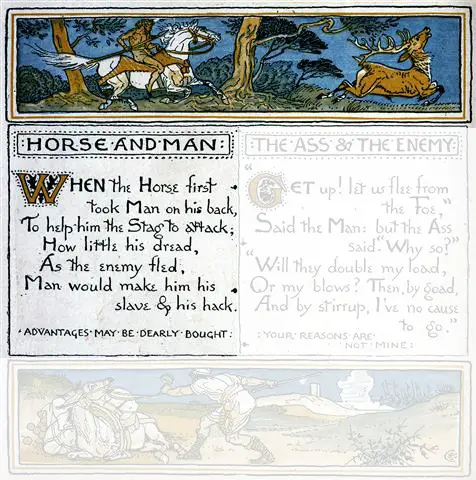
When the Horse first took Man on his back,
To help him the Stag to attack;
How little his dread,
As the enemy fled,
Man would make him his slave & his hack.
Advantages may be dearly bought.

Equus et Venator
Equus et cervus inimicitias habebant inter se. Equus sese ad venatorem contulit et ait, “Est cervus mirabilis, quem si venabulo poteris transfigere carne abundabis. Tu vero, super me sedens, cum secutus fuero, venabulo manu tua excussa; cervo occiso, gratulabimur ambo.” Hoc dicto, venator, super equum sedens, cervum de loco movit sagittis et incursu. Cervus in saltum cursu veloci illaesus evasit. Equus vero, cum se sudore fatigatum videret, sic dixisse fertur, “Descende et solito more transige vitam tuam.” Cui contra sessor desuper, “Non habes,” inquit, “potestatem currendi, qui frenum in ore habes, nec saltum dare potes, quia sella te premit. Si calcitrare volueris, flagellum in manu teneo.”
Moral
Illos increpat haec fabula qui, cum voluerint alios nocere, se potius subiugant.
Perry #269


